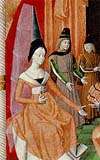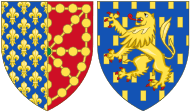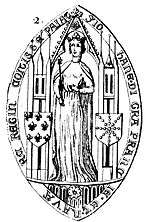Joan II, Countess of Burgundy
| Joan II | |
|---|---|
 | |
| Countess of Burgundy | |
| Reign | 1315–1330 |
| Predecessor | Robert |
| Successor | Joan III |
| Countess of Artois | |
| Reign | 1329–1330 |
| Predecessor | Matilda |
| Successor | Joan III |
| Queen consort of France and Navarre | |
| Reign | 1316–1322 |
| Born | 15 January 1292 |
| Died |
21 January 1330 (aged 38) Roye-en-Artois |
| Burial | Saint Denis Basilica |
| Spouse | Philip V of France |
| Issue |
Joan III, Countess of Burgundy Margaret I, Countess of Burgundy Isabelle, Dauphine of Viennois Blanche of France |
| House | Ivrea |
| Father | Otto IV, Count of Burgundy |
| Mother | Mahaut, Countess of Artois |
| Religion | Roman Catholicism |
Joan II, Countess of Burgundy (French: Jeanne; 15 January 1292 – 21 January 1330), was the eldest daughter and heiress of Otto IV, Count of Burgundy, and Mahaut, Countess of Artois, and was Queen of France as the wife of Philip V of France.
Biography

In the beginning of 1314, Joan's sister Blanche and her sister-in-law Margaret were convicted of adultery with two knights, upon the testimony of their sister-in-law, Isabella in the Tour de Nesle Affair. Joan was thought to have known of the affairs, and was placed under house arrest at Dourdan as punishment. She continued to protest her innocence, as did her husband, who had refused to repudiate her, and by 1315 – through the influence of her mother and husband – her name had been cleared by the Paris Parlement, and she was allowed to return to court.
With the death of King John I of France, her husband became King Philip V of France; Joan became queen consort. She was crowned with her husband at Reims on 9 January 1317.
Her father, the Count of Burgundy, died in 1302, and his titles were inherited by his only legitimate son, Robert. Upon Robert's death in 1315, the County of Burgundy was inherited by Joan. In 1329, she inherited her mother's County of Artois.
After her husband's death, Joan lived in her own domains. It dealt her a devastating blow from which she never recovered, sinking into a deep depression for the rest of her life. After her beloved sister died in 1324, she was said to be "so sorrowful as never before she had been." She died at Roye-en-Artois, on 21 January 1330, and was buried in Saint-Denis beside her husband. Her titles were inherited by her eldest daughter, Joan III, who had married Odo IV, Duke of Burgundy, in 1318. With Joan II's death, the County and Duchy of Burgundy became united through this marriage. The Counties of Burgundy and Artois were eventually inherited by her younger daughter Margaret in 1361.
Joan left provision in her will for the founding of a college in Paris; it was named Collège de Bourgogne, "Burgundy College."
Issue

With Philip V of France:
- Joan (1/2 May 1308 – 10/15 August 1349), Countess of Burgundy and Artois in her own right and wife of Odo IV, Duke of Burgundy
- Margaret (1309 – 9 May 1382), wife of Louis I of Flanders. Countess of Burgundy and Artois in her own right.
- Isabelle (1310 – April 1348), wife of Guigues VIII de La Tour du Pin, Dauphin de Viennois.
- Blanche (1313 – 26 April 1358), a nun.
- Philip (24 June 1316 – 24 February 1317).
In fiction
Joan (as Jeanne) is a character in Les Rois maudits (The Accursed Kings), a series of French historical novels by Maurice Druon. She was portrayed by Catherine Rich in the 1972 French miniseries adaptation of the series, and by Julie Depardieu in the 2005 adaptation.[1][2]
Ancestry
| Ancestors of Joan II, Countess of Burgundy | |||||||||||||||||||||||||||||||||||||||||||||||||||||||||||||||||||||||||||||||||||||||||||||||||||||||||||||||||||||||||||||||||||||||||||||||||||||||||||||||||||||||||||||||||||||||||||||||||||||||||||||||||||||||||||||||||||||||||||||||||||||
|---|---|---|---|---|---|---|---|---|---|---|---|---|---|---|---|---|---|---|---|---|---|---|---|---|---|---|---|---|---|---|---|---|---|---|---|---|---|---|---|---|---|---|---|---|---|---|---|---|---|---|---|---|---|---|---|---|---|---|---|---|---|---|---|---|---|---|---|---|---|---|---|---|---|---|---|---|---|---|---|---|---|---|---|---|---|---|---|---|---|---|---|---|---|---|---|---|---|---|---|---|---|---|---|---|---|---|---|---|---|---|---|---|---|---|---|---|---|---|---|---|---|---|---|---|---|---|---|---|---|---|---|---|---|---|---|---|---|---|---|---|---|---|---|---|---|---|---|---|---|---|---|---|---|---|---|---|---|---|---|---|---|---|---|---|---|---|---|---|---|---|---|---|---|---|---|---|---|---|---|---|---|---|---|---|---|---|---|---|---|---|---|---|---|---|---|---|---|---|---|---|---|---|---|---|---|---|---|---|---|---|---|---|---|---|---|---|---|---|---|---|---|---|---|---|---|---|---|---|---|---|---|---|---|---|---|---|---|---|---|---|---|---|---|---|---|
| |||||||||||||||||||||||||||||||||||||||||||||||||||||||||||||||||||||||||||||||||||||||||||||||||||||||||||||||||||||||||||||||||||||||||||||||||||||||||||||||||||||||||||||||||||||||||||||||||||||||||||||||||||||||||||||||||||||||||||||||||||||
See also
References
- ↑ "Official website: Les Rois maudits (2005 miniseries)" (in French). 2005. Archived from the original on 15 August 2009. Retrieved 25 July 2015.
- ↑ "Les Rois maudits: Casting de la saison 1" (in French). AlloCiné. 2005. Archived from the original on 19 December 2014. Retrieved 25 July 2015.
| French nobility | ||
|---|---|---|
| Preceded by Robert |
Countess Palatine of Burgundy 1315–1330 With: Philip II (1315–1322) |
Succeeded by Joan III |
| Preceded by Matilda |
Countess of Artois 1329–1330 | |
| French royalty | ||
| Preceded by Clementia of Hungary |
Queen consort of France and Navarre 1316–1322 |
Succeeded by Blanche of Burgundy |